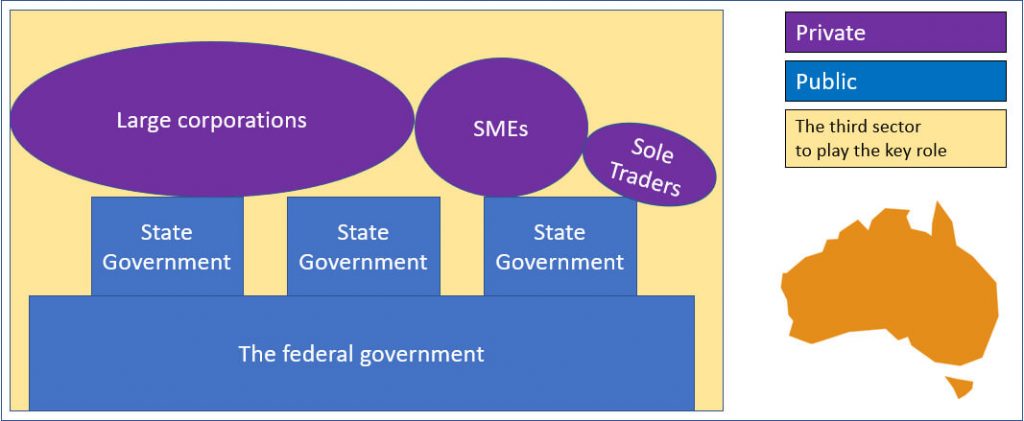
- Author: Ferdinand Kuncoro | Director (Treasury & Finance) The Digital Gap Initiative
- Posted: June 7, 2020
The Third Sector’s Critical Role in Global Pandemic Recovery
By Ferdinand Kuncoro | Director (Treasury & Finance) The Digital Gap Initiative
One-third of Australians are suffering financial losses from COVID-19 according to the latest ABS survey, with more than 1 million casuals set to miss out on the JobKeeper scheme, including staff at universities, construction, arts and entertainment – this has led to many Australians experiencing mental distress at this unprecedented time in history.
Regardless of whether the shape of the recovery is V, U, or L, the pain is too real, be it financially or the real impact on mental health and our wellbeing. This is uncharted territory as Australia is experiencing, the first recession in almost 30 years. No country has the playbook. The brutal reality is that the economy will not just snap back; weak wages, elevated debt level, and lower productivity will still haunt most Australians for many years to come.
To speed up the recovery and most importantly to help everyone in every corner of this country, Australia’s federal and state governments need to encourage more innovative solutions which require public, private and third sector organisations to work together helping different targeted demographics. It is in our interest to ensure that the most disadvantaged in our communities also share in the benefits of our post-COVID 19 spending.

The usual victim
In a crisis, people coming from disadvantaged backgrounds suffer the most, as this global pandemic has shown, there are systemic flaws and extreme inequalities in the world and sadly the same applies in Australia.
There are some merits in believing that a society with some degrees of wealth inequality is good to the economy as it promotes industriousness, social mobility, and innovation. However, it is important that everyone including the most marginalised has the right to basic economic security, dignity, and opportunity.
Businesses function as they are intended: to make profits, consequently they leave 20% or more the people who are simply unlucky and disadvantaged in society. The government announces policy in a rush to calm people down and prevent widespread panic, as a result, many people are left behind.
There are three key factors why the role of the third sector is unique and without its involvements, we will end up with a different kind of world: a less kind, less respectful, and a less loving world. Those key factors are value, incentive, and efficiency.
Human values and market values are not the same
We cannot monetise all the positive causes in the world–hence there are many important human aspects that do not have market value. Non-profit and charities play the key pivotal role in the areas where humanity matters, but the market does not care. We need to embrace both values and an acknowledgment is needed so we do not mix them up and result in a big misconception that we advance humanity when in fact we only improve company profitability.
It is exactly the time to treat everyone with compassion and share the pain; expertise that most non-profits possess abundantly. Profit itself is not a dirty word, but it is a completely different word from solidarity, love, and caring with no expectation of return.
The right incentive
Politicians are elected based on policy promises, often with a lack of passion, understanding, and research of the implementation challenges. The result will be out-of-touch and inefficient solutions.
CEOs focus on how to maximise the total shareholder return, though the latest development is that many top CEOs say that shareholder value is no longer everything, the public is still sceptical about this newly stated ideal, and it is completely understandable especially when tough times come, the first action is to furlough workers and even worse making them out-of-jobs.
The word incentive and non-profit may be contradictory. The fact is that the non-profit sector has attracted $11 billion in the value of formal volunteering. Why would anyone want to do unpaid work? There is potentially more than a dozen of different answers. An often-cited answer is that it brings great personal satisfaction and happiness which will feed the top 3 needs in Maslow’s hierarchy of needs: love/belonging, esteem, and self-actualisation. The third sector has the right incentive to advance humanity forward by working with vulnerable Australians and socially progressive policies to touch everyone, at least they try.
Beat the government at innovation game
Australians’ trust in government reaches a new all-time low, according to the 2019 ANU’s election study. Partisanship often stands in the way of progress. The government is also lagging in some key issues such as climate change, eradicating poverty and skills for the future.
The third sector can deliver more innovative, less onerous, and more targeted solutions as more than 47,000 non-profit organisations and charities in Australia work in their own way, with the best expertise they have, help communities they are remarkably familiar with, with one shared goal: moving humanity forward.
The way forward
Around the world, this COVID-19 crisis could push half a billion people into poverty as per the World Economic Forum. Although the impact in Australia is less severe, life is a life – they are not just numbers.
The third sector may not sound like big business in Australia-however, it employs 840,500 full-time-equivalent (FTE) paid workers and further 471,700 FTE indirect employment (Deloitte Access Economics). Their contribution is up to $140 billion; it is equivalent in size to the Australian retail, education and training, or the public sector. They run research centres, art organisations, schools and religious organisations, community centres, and even hospitals. Very often the third sector offers the first helping hand.
The cooperation for all the three sectors is needed to ensure most Australians have a way out of this crisis. There are many things that we can easily quantify such as mortgage payments, rental expenses, food on the table, but there is a dark reality about mental health and the third sector is the key to alleviate this dire situation.








